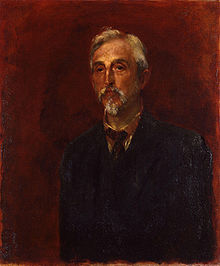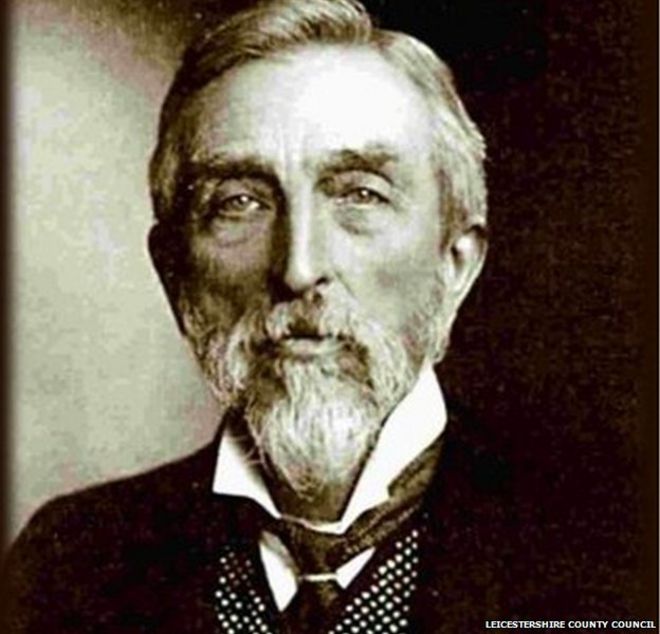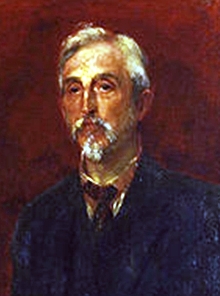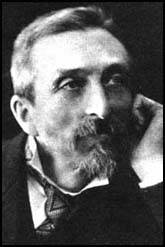Charles Booth (philanthropist)
Charles Booth ( born March 30, 1840 in Liverpool, † November 23, 1916 in Thringstone, Leicestershire ) was a British philanthropist and social researcher, known for his documentation of the living conditions of the working class in London at the end of the 19th century, Henry Mayhew Besides Booth is one. the pioneers of urban research.
Life
Booth was the second oldest child of a wealthy Liverpool merchant grain Charles Booth Senior. The family was politically liberal and a member of the Unitarian faith. Charles ' mother died when he was 13, his father when he was 20 and this he lost with 22 nor the woman he wanted to marry. He attended the Royal Institution School in Liverpool, and made after the completion in 1856 a four-year internship in the shipping company Lampson & Holt, he got mediated through family contacts. Later, he opened himself and his brother a company ( the Booth Steamship Company), which dealt mainly with skins and leather. He built this on the New York field office of the company. In 1864 he returned to Liverpool and took a lively design and construction of two new steam ships, of which he accompanied one also on her maiden voyage to South America. Booth also pursued political projects such as the organization of labor movements, the creation of a universal, secular education or a parliamentary candidacy. Among others, since all these ambitions were failures, he fell into a strong personal crisis and estranged from his previous environment. In 1871 he had married Mary Macauley, who accompanied him to further collapse in 1873 of a recovery trip to the Continent. Following this they moved to London in 1875 and after the successful rescue of a share company in America, Booth had also recovered completely and suffered no further collapse. In London he met up with fellow socialists often called, "Symposium ". The Royal Statistical Society joined Booth in 1885 and 1892 even the President.
Life and Labour of the People in London
Charles Booth has gained through his work on poverty in London is famous. The occasion of this study was a dispute with the founder of two socialist parties in England, Henry Mayers Hyndman. This had claimed that a quarter of all London live in poverty and Booth wanted to refute this. He analyzed the census of 1881 and compared it with that of 1801, often visited the East End of London and eventually started create his own collection. We interviewed all persons, among others, according to employment, income and family size. On these data Booth made a classification that of the lowest class A to H class - and all handed about it - the upper middle class. He made also detailed maps to where the classes were illustrated in color from dark ( poor ) to Bright ( wealthy ). In 1893 he made a reclassification of a combined system of ranks such as: was determined poverty, population density, age of marriage, fertility and mortality rates. The study Life and Labour of the People in London comprises 17 volumes and can be divided into three categories: poverty, industry and religion. Booth always used while the results that he had previously purchased in order to find the study goal for the next work out. In the end, he came to the conclusion that even more than 30 % of London lived in poverty and has been reflecting on how this failure was to fix.
Politics
One of the main findings of his study was the problem of poverty in old age. Although he was a lifelong conservative person, who stressed individualism, he sat down heavily on state pensions, a, which earned him the appointment to the Royal Commision on the Aged Poor. Despite his contact and his friendship with British socialists, he rejected the idea of socialism strictly, was even better as he grew older, clearly it. Noteworthy is still his view of the people, which he arranged in class A. Quoted from Lindner he writes it " afford a useful service to create no wealth, rather they destroy him. Whatever they touch they spoil " ( Walks On The Wild Side ). He provides them not being able to make amends and sets all auxiliary considerations also only at class B. On the maps, the districts of Class A were added to black and you were casual workers, bums and semi- criminals assigned.
Honors
Due to his achievements Booth should be knighted, but you brought previously learned that he would prefer the position of the secret Council a knighthood. In 1904 he received an honorary doctorate at Oxford and the University of Liverpool, there is the Charles Booth Lectureship. In Saint Paul 's Cathedral a plaque to commemorate him and the Toynbee Hall has a grand piano, which has been renamed after the renovation in Charles Booth House. Moreover, his efforts for the state pension after the entry of the Liberal Party were implemented in the government in 1906 still in reality.








%252520364px.jpg)

